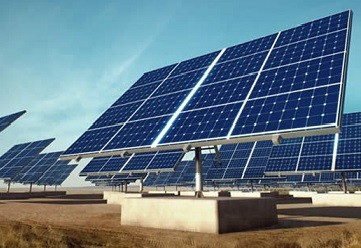Chinese companies are taking the lead in developing clean energy in Africa, a continent with huge energy deficit, particularly Zimbabwe, the Xinhua News Agency reported.
According to the report, three Chinese companies have secured the deals to build Zimbabwe's first large-scale solar power stations, which are expected to add 300 MW of electricity to the national grid currently supplying less than 1,000 MW against peak demand of 2,200 MW.
Zimbabwe Power Company (ZPC) said that it signed an agreement for the three deals with Intratrek Zimbabwe in partnership with Chinese firm CHINT Electric to construct a $202-million plant in Gwanda, Matabeleland South Province.
The report said that Number Seventeen Metallurgical China signed a second agreement with ZPC for the construction of another $163 million plant in Munyati, Midlands Province, and the third with communications giant ZTE for the $197 million Insukamini project in Matabeleland North Province.
The deals on cleaner renewable solar technology are expected to augment supplies from the old Hwange Thermal Power Station, which is constantly breaking down, and at the Kariba Hydro Power Station, which is currently suffering from low water levels due to drought in the region.
A spokesperson for ZPC's parent company ZESA Holdings said recently that the development of solar power generation will be supported by the power utility.
"Solar power plants are quicker to construct and are quite suitable for phased construction," the spokesperson said. "As the technology matures, prices are expected to further drop so that it can come at an affordable tariff."
China has also been considering Africa for growth in its PV (photovoltaic) sector as Africa's energy deficit and sunny climate are favorable for the growth of the solar power industry.
Fatima Denton, director of the special initiatives division in the United Nations Economic Commission for Africa (UNECA), told African delegates at a regional climate change conference that there is a need for Africa to ensure energy security through investment in renewable energy as the continent had become increasingly vulnerable to climate change.
Denton said that Africa has numerous renewable energy sources such as hydro power, geothermal, biomass, solar and wind energy, and these presented huge investment opportunities for China. He added that Africa continued to lag behind in renewable energy mainly due to lack of funding to finance clean energy projects.
Zambia and South Africa, Zimbabwe's neighbors, are also pushing for solar energy development with Zambia, hoping to triple power output to 6,000 MW in two years by expanding solar energy projects with foreign investors.
Zimbabwe currently has two major power plants. One is the hydro-electrical 750 MW plant in Kariba, completed in 1977, and the thermal 920 MW Hwange station commissioned between 1983 and 1987. The two plants were generating 606 MW and 545 MW, respectively, as of June.
Zimbabwe shares Lake Kariba with Zambia, which gets 90 percent of its power on the northern bank of the dam wall.
In partnership with Chinese company Sino Hydro, Zimbabwe is expanding the Kariba South power station to produce an additional 300 MW at a cost of $355 million.
The report said that the Zimbabwe Energy Regulatory Authority also licensed 21 independent power projects, which require a total $10 billion.
The country's biggest thermal power station, which has an installed capacity of 920 MW, is also in Hwange, and smaller ones are found in Harare, Bulawayo and Munyati.
The report added that Sino-Hydro will start the expansion of the Hwange Thermal Power Station in 2016 to add another 600 MW to the grid.
In early November, Finance and Economic Development told parliamentarians that Chinese institutions are set to release $1.1 billion for the expansion of the power station.



























